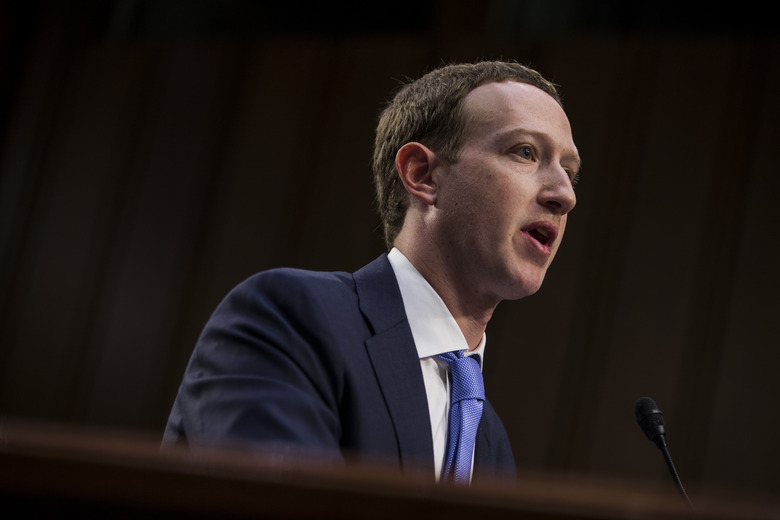How Facebook Is Cracking Down On Fake News (And Why Fake News Works)
2018 is definitely the year of "Fake News."
And even though we all know fake news exists – and can probably list a few places to find it – fake stories and misinformation still run rampant.
The problem is so bad that Facebook is now facing major heat for being a source of fake news, and has made it a business priority to address the problem. Facebook founder and CEO Mark Zuckerberg testified before the Senate earlier this year about its fake news problem (amongst other issues). And both the UK and Canadian governments have summoned him for questioning about fake news, too.
So it's no surprise that, just last week, Facebook published "The Hunt for False News," a set of three case studies on how they're tracking down and dealing with false info. In the post, Facebook product manager Antonia Woodford writes about their artificial intelligence (AI) found photos and videos recirculated with false captions. It also identified some more obviously scammy news – like the false claim that NASA will pay you $100,000 to take part in a 60-day bed rest studies – that had still been viewed millions of times.
So why does fake news still work, even when we already know fake stories are all over the internet? It all boils down to how our brain processes information. Here's what you need to know.
One Major Reason? Confirmation Bias
One Major Reason? Confirmation Bias
Maybe the biggest reason that fake news is so effective is because we're wired to prioritize info that already aligns with our worldview (or in other words, you're biased toward info that confirms your beliefs).
Makes sense, right? When you see a story that goes along with what you already believe, you're less likely to think "huh, really?!" and more likely to think "hmm, that makes sense!"
The effect is so strong that we're even hardwired to reject or distort information that goes against our beliefs, Mark Whitmore, PhD, an assistant professor at Kent State University, told attendees at the annual convention of the American Psychological Association. And we're also biased in favor of news that makes us happy (an effect called desirability bias) and more likely to perhaps falsely reject bad news.
Another Cause? More Mental Clutter
Another Cause? More Mental Clutter
Looking at the root of why fake news works means going back to the basic way your brain processes information. While your brain continually stores new information, creating new networks between your nerve cells to make short- and long-term memories, it can "delete" information too. And your brains is naturally able to clear the "cutter," filtering out info that's deemed useless and keeping info deemed important.
But some people's brains are better able to clear "clutter" than others, Scientific American explains. And those with more mental clutter may be more likely to hold on to false beliefs – and fake news – even after they've been debunked.
So What Can You Do to Fight Fake News Stories?
So What Can You Do to Fight Fake News Stories?
False information can be tough to spot, especially if it comes linked to a reputable source (like that fake sleep study that mentioned NASA). But there are a few ways to learn to sort fact from fiction.
- **Identify common "tells."** Some fake news stories follow similar patterns: they're outrageous or seem kinda too good (or bad) to be true. Click here to learn about a few common ones in health research to ID stories that might need a closer look.
- **Seek out different viewpoints.** Confirmation bias means we all have a tendency to create our own news bubbles. Look at conflicting opinions to be part of a broader conversation.
- **Ask questions.** Skepticism is great, and being able to question your beliefs is the sign of a great scientist. So don't be afraid to explore why people believe what they do – their answers might change how you think.
- Have a laugh. One of the roots of believing false news is anxiety – retreating from a truth that's just too stressful. Watching political satire or comedy can ease your anxiety, according to Mark Whitmore, which could help you better deal with fake news.
Cite This Article
MLA
Tremblay, Sylvie. "How Facebook Is Cracking Down On Fake News (And Why Fake News Works)" sciencing.com, https://www.sciencing.com/how-facebook-is-cracking-down-on-fake-news-and-why-it-works-13715644/. 31 October 2018.
APA
Tremblay, Sylvie. (2018, October 31). How Facebook Is Cracking Down On Fake News (And Why Fake News Works). sciencing.com. Retrieved from https://www.sciencing.com/how-facebook-is-cracking-down-on-fake-news-and-why-it-works-13715644/
Chicago
Tremblay, Sylvie. How Facebook Is Cracking Down On Fake News (And Why Fake News Works) last modified March 24, 2022. https://www.sciencing.com/how-facebook-is-cracking-down-on-fake-news-and-why-it-works-13715644/
